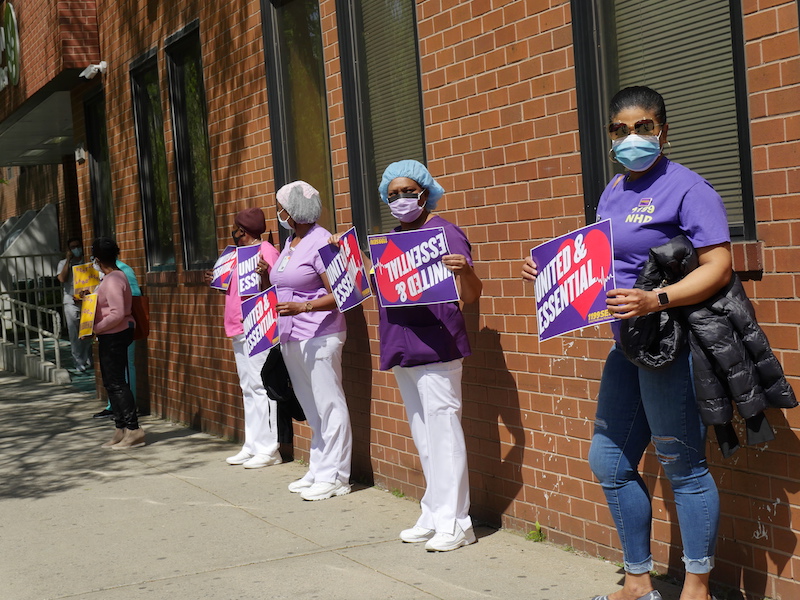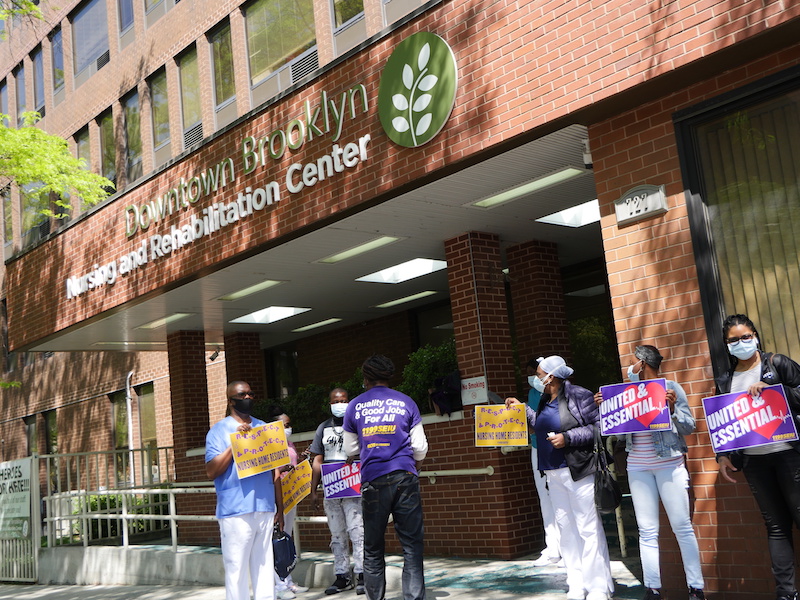NEW YORK, N.Y.—Workers from 36 nursing homes and long-term care facilities around New York State held silent vigils May 20, demanding adequate protective gear and staffing, crisis pay, and respect for the work they’ve been doing.

“Workers want to be recognized for risking their lives,” 1199SEIU spokesperson Cara Noel tells LaborPress. “1199 members have been on the frontlines of this crisis every day from the beginning. They’ve gowned up and stabilized people who were unable to care for themselves.”
The union, which represents workers at for-profit nursing homes, said that the corporate networks that own scores of nursing homes were refusing “to acknowledge the risks and sacrifices that are being made during the COVID-19 crisis” and had failed “to recognize the grief and loss being experienced by caregivers.”
The vigils, held outside nursing homes in Brooklyn, Queens, Rockville Centre and St. James on Long Island, the Hudson Valley, the village of Queensbury north of Albany, Utica, and Rochester, followed strict social-distancing guidelines, 1199 said. No one chanted, and all participants wore masks and stood at least six feet apart.
Nursing-home residents, who are generally elderly, already in declining health, and living in close proximity, are extremely vulnerable to COVID-19. The first major cluster of the infection occurred at one in the Seattle suburbs in February. Since then, at least one-third of the people who died from the virus in the U.S. have been nursing-home patients, with the proportion above 80% in Minnesota and 70% in Ohio. In New York State, at least 5,700 patients were confirmed or presumed to have died from the virus as of May 20, according to the state Department of Health, with about 15 facilities reporting more than 50 deaths.
They present particular problems for preventing the disease from spreading because of the way they’re set up, Noel explains. “It’s complicated when someone has dementia and doesn’t understand the need to change their routine,” she says.

1199 members also report shortages of personal protective equipment and say their workplaces lack adequate staff to take care of patients. Some have enough masks but not enough gowns, while others have enough gowns but not enough masks. The industry-standard N95 masks are supposed to be changed after every exposure to an infected person, Noel says, but that’s difficult with a national shortage and some workers being exposed to 15 infected people a day.
“Folks are being asked to keep their masks on for a week,” she says. Some 1199 members have to quarantine themselves when they come home to avoid the possibility of infecting their families.
A report released May 20 by the federal General Accounting Office found that over the past seven years, about 40% of nursing homes had “infection prevention and control deficiencies,” such as failing to isolate sick residents or provide personal protective equipment to staff. Those problems have been intensified by private-equity firms, which now own about one-ninth of the nation’s nursing homes, seeking to slash costs and extract more profits. A study released in March by business schools at the University of Pennsylvania, New York University, and the University of Chicago found “a robust decline in nursing staff” coupled with increases in the number of patients immediately after private-equity takeovers.
The House passed a bill, the Heroes Act, on May 15 that would give “essential workers,” including those in health care, up to $10,000 in hazardous-duty pay.
“Through this legislation, more health-care workers would have access to the crisis pay, stimulus relief, and student loan forgiveness that would allow them to focus on protecting their patients, their families, and themselves without the fear of financial hardship,” 1199SEIU President George Gresham said in a statement. “We are calling on the Senate to do the same, and to ensure that this relief is extended to all health-care workers — whether they work in hospitals, nursing homes, or private homes. Our recovery is dependent on these dedicated caregivers and their work to flatten the curve of this pandemic.”
The Senate has so far refused to consider the bill.

